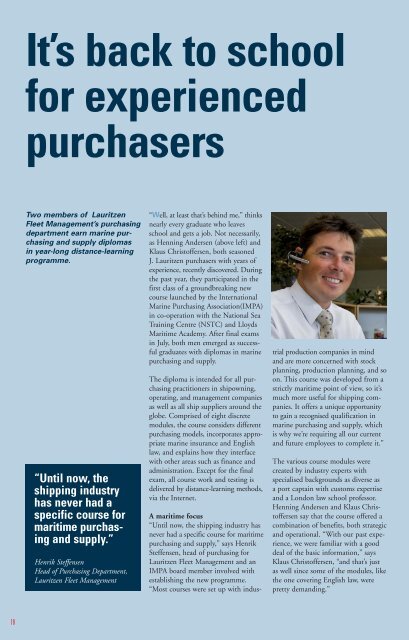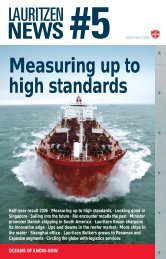Issue No. 7, September 2007 - J. Lauritzen
Issue No. 7, September 2007 - J. Lauritzen
Issue No. 7, September 2007 - J. Lauritzen
Create successful ePaper yourself
Turn your PDF publications into a flip-book with our unique Google optimized e-Paper software.
18<br />
It’s back to school<br />
for experienced<br />
purchasers<br />
Two members of <strong>Lauritzen</strong><br />
Fleet Management’s purchasing<br />
department earn marine purchasing<br />
and supply diplomas<br />
in year-long distance-learning<br />
programme.<br />
“Until now, the<br />
shipping industry<br />
has never had a<br />
specific course for<br />
maritime purchasing<br />
and supply.”<br />
Henrik Steffensen<br />
Head of Purchasing Department,<br />
<strong>Lauritzen</strong> Fleet Management<br />
“Well, at least that’s behind me,” thinks<br />
nearly every graduate who leaves<br />
school and gets a job. <strong>No</strong>t necessarily,<br />
as Henning Andersen (above left) and<br />
Klaus Christoffersen, both seasoned<br />
J. <strong>Lauritzen</strong> purchasers with years of<br />
experience, recently discovered. During<br />
the past year, they participated in the<br />
first class of a groundbreaking new<br />
course launched by the International<br />
Marine Purchasing Association(IMPA)<br />
in co-operation with the National Sea<br />
Training Centre (NSTC) and Lloyds<br />
Maritime Academy. After final exams<br />
in July, both men emerged as successful<br />
graduates with diplomas in marine<br />
purchasing and supply.<br />
The diploma is intended for all purchasing<br />
practitioners in shipowning,<br />
operating, and management companies<br />
as well as all ship suppliers around the<br />
globe. Comprised of eight discrete<br />
modules, the course considers different<br />
purchasing models, incorporates appropriate<br />
marine insurance and English<br />
law, and explains how they interface<br />
with other areas such as finance and<br />
administration. Except for the final<br />
exam, all course work and testing is<br />
delivered by distance-learning methods,<br />
via the Internet.<br />
A maritime focus<br />
“Until now, the shipping industry has<br />
never had a specific course for maritime<br />
purchasing and supply,” says Henrik<br />
Steffensen, head of purchasing for<br />
<strong>Lauritzen</strong> Fleet Management and an<br />
IMPA board member involved with<br />
establishing the new programme.<br />
“Most courses were set up with indus-<br />
trial production companies in mind<br />
and are more concerned with stock<br />
planning, production planning, and so<br />
on. This course was developed from a<br />
strictly maritime point of view, so it’s<br />
much more useful for shipping companies.<br />
It offers a unique opportunity<br />
to gain a recognised qualification in<br />
marine purchasing and supply, which<br />
is why we’re requiring all our current<br />
and future employees to complete it.”<br />
The various course modules were<br />
created by industry experts with<br />
specialised backgrounds as diverse as<br />
a port captain with customs expertise<br />
and a London law school professor.<br />
Henning Andersen and Klaus Christoffersen<br />
say that the course offered a<br />
combination of benefits, both strategic<br />
and operational. “With our past experience,<br />
we were familiar with a good<br />
deal of the basic information,” says<br />
Klaus Christoffersen, “and that’s just<br />
as well since some of the modules, like<br />
the one covering English law, were<br />
pretty demanding.”



![41367 JL News 11 [6].indd - J. Lauritzen](https://img.yumpu.com/11983725/1/166x260/41367-jl-news-11-6indd-j-lauritzen.jpg?quality=85)

